2015年高考真题英语听力真题及听力原文附答案(全国卷).doc
- 格式:doc
- 大小:37.50 KB
- 文档页数:4
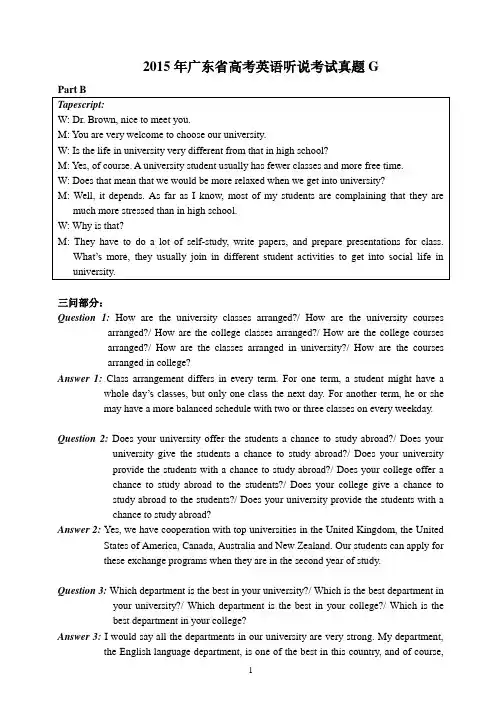
2015年广东省高考英语听说考试真题G三问部分:Question 1:How are the university classes arranged?/ How are the university courses arranged?/ How are the college classes arranged?/ How are the college coursesarranged?/ How are the classes arranged in university?/ How are the coursesarranged in college?Answer 1:Class arrangement differs in every term. For one term, a student might have a whole day’s classes, but only one class the next day. For another term, he or shemay have a more balanced schedule with two or three classes on every weekday.Question 2:Does your university offer the students a chance to study abroad?/ Does your university give the students a chance to study abroad?/ Does your universityprovide the students with a chance to study abroad?/ Does your college offer achance to study abroad to the students?/ Does your college give a chance tostudy abroad to the students?/ Does your university provide the students with achance to study abroad?Answer 2:Yes, we have cooperation with top universities in the United Kingdom, the United States of America, Canada, Australia and New Zealand. Our students can apply forthese exchange programs when they are in the second year of study.Question 3:Which department is the best in your university?/ Which is the best department in your university?/ Which department is the best in your college?/ Which is thebest department in your college?Answer 3:I would say all the departments in our university are very strong. My department, the English language department, is one of the best in this country, and of course,the best in our university. It has a history of more than 80 years. The physicsdepartment also attracts many students for its excellent professors.五答部分:Question 1:What are Dr. Brown’s students complaining about?Answer 1:That they are much more stressed than in high school./ There are more stress in university.Question 2:How do university students get into social life?Answer 2:By joining different student activities./ By taking part in different student activities./ By participating in different student activities.Question 3:What is a more balanced schedule according to Dr. Brown?Answer 3:There are two or three classes on every weekday./ With two or three classes on every weekday.Question 4:When can the students apply for the exchange programs?Answer 4:When they are in the second year of study.Question 5:How long is the history of Dr. Brown’s department?Answer 5:More than 80 years./ Over 80 years./ Above 80 years.参考复述:Tom was a young boy who moved slowly, but even worse he couldn’t speak properly. He had to repeat his words three or four times to say what he wanted. Before he started primary school, his mother was worried that the other kids would bully him and that he wouldn’t have any friends. So she was surprised when Tom came home in a good mood, and had many things to share every day. She went to his school one day, and saw him playing basketball with some boys. The ball hit Tom several times, but instead of laughing at him, the others helped him. The boys told her that they loved having Tom around, since they could always remember what the teachers had said in class when he repeated it. When she heard that, Mary felt released. She knew she wouldn’t have to worry abo ut Tom any longer.。
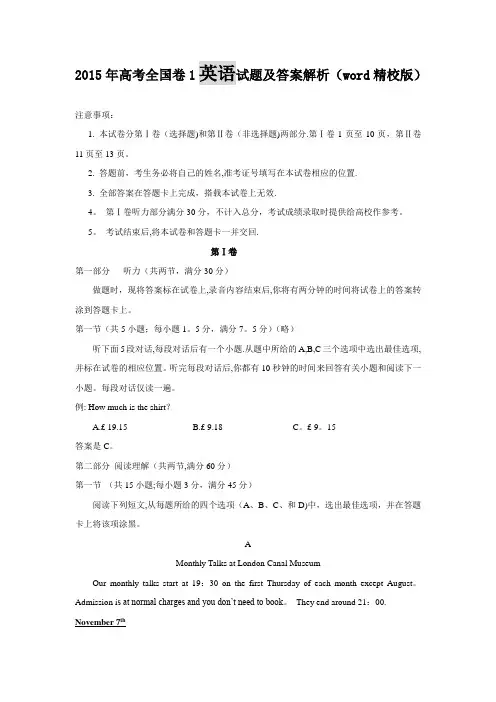
2015年高考全国卷1英语试题及答案解析(word精校版)注意事项:1. 本试卷分第Ⅰ卷(选择题)和第Ⅱ卷(非选择题)两部分.第Ⅰ卷1页至10页,第Ⅱ卷11页至13页。
2. 答题前,考生务必将自己的姓名,准考证号填写在本试卷相应的位置.3. 全部答案在答题卡上完成,搭载本试卷上无效.4。
第Ⅰ卷听力部分满分30分,不计入总分,考试成绩录取时提供给高校作参考。
5。
考试结束后,将本试卷和答题卡一并交回.第Ⅰ卷第一部分听力(共两节,满分30分)做题时,现将答案标在试卷上,录音内容结束后,你将有两分钟的时间将试卷上的答案转涂到答题卡上。
第一节(共5小题;每小题1。
5分,满分7。
5分)(略)听下面5段对话,每段对话后有一个小题.从题中所给的A,B,C三个选项中选出最佳选项,并标在试卷的相应位置。
听完每段对话后,你都有10秒钟的时间来回答有关小题和阅读下一小题。
每段对话仅读一遍。
例: How much is the shirt?A.£ 19.15B.£ 9.18 C。
£ 9。
15答案是C。
第二部分阅读理解(共两节,满分60分)第一节(共15小题;每小题3分,满分45分)阅读下列短文,从每题所给的四个选项(A、B、C、和D)中,选出最佳选项,并在答题卡上将该项涂黑。
AMonthly Talks at London Canal MuseumOur monthly talks start at 19:30 on the first Thursday of each month except August。
Admission i s at normal charges and you don’t need to book。
They end around 21:00. November 7thThe Canal Pioneers,by Chris Lewis。
James Brindley is recognized as one of the leading early canal engineers。
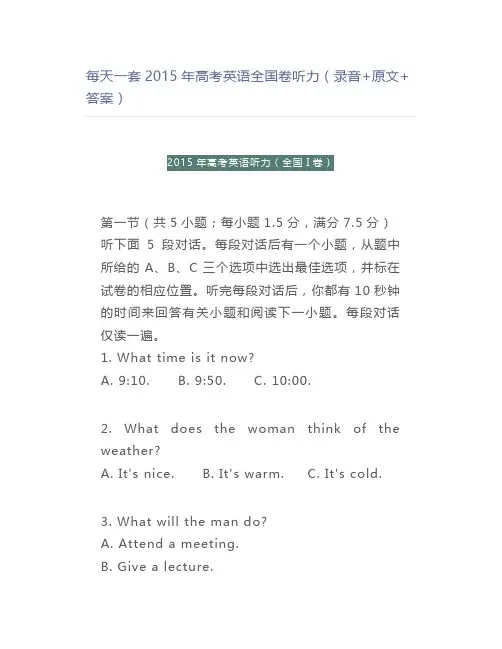
每天一套2015年高考英语全国卷听力(录音+原文+答案)2015第一节(共5小题;每小题1.5分,满分7.5分)听下面5段对话。
每段对话后有一个小题,从题中所给的A、B、C三个选项中选出最佳选项,并标在试卷的相应位置。
听完每段对话后,你都有10秒钟的时间来回答有关小题和阅读下一小题。
每段对话仅读一遍。
1. What time is it now?A. 9:10.B. 9:50.C. 10:00.2. What does the woman think of the weather?A. It's nice.B. It's warm.C. It's cold.3. What will the man do?A. Attend a meeting.B. Give a lecture.C. Leave his office.4. What is the woman's opinion about the course?A. Too hard.B. Worth taking.C. Very easy.5. What does the woman want the man to do?A. Speak louder.B. Apologize to her.C. Turn off the radio.第二节(共15小题;每小题1.5分,满分22.5分)听下面5段对话或独白。
每段对话或独白后有几个小题,从题中所给的A、B、C三个选项中选出最佳选项,并标在试卷的相应位置。
听每段对话或独白前,你将有时间阅读各个小题,每小题5秒钟;听完后,各小题将给出5秒钟的作答时间。
每段对话或独白读两遍。
听第6段材料,回答第6、7题。
6. How long did Michael stay in China?A. Five days.B. One week.C. Two weeks.7. Where did Michael go last year?A. Russia.B. Norway.C. India.听第7段材料,回答第8、9题。
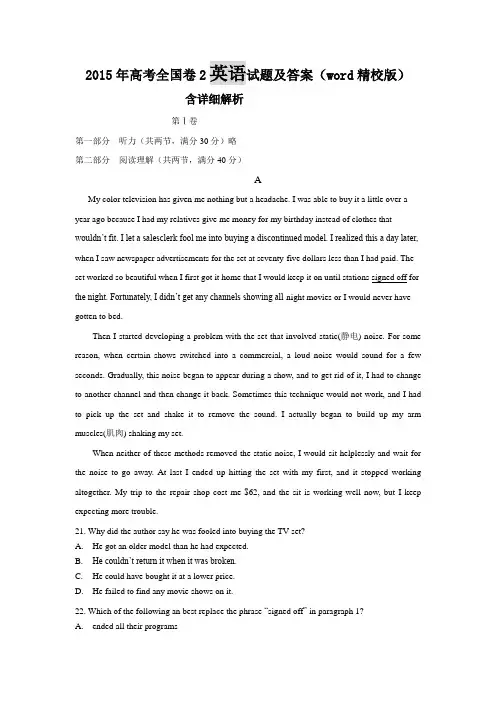
2015年高考全国卷2英语试题及答案(word精校版)含详细解析第Ⅰ卷第一部分听力(共两节,满分30分)略第二部分阅读理解(共两节,满分40分)AMy color television has given me nothing but a headache. I was able to buy it a little over a year ago because I had my relatives give me money for my birthday instead of clothes that wouldn’t fit. I let a salesclerk fool me into buying a discontinued model. I realized this a day later, when I saw newspaper advertisements for the set at seventy-five dollars less than I had paid. The set worked so beautiful when I first got it home that I would keep it on until stations signed off for the night. Fortunately, I didn’t get any channels showing all-night movies or I would never have gotten to bed.Then I started developing a problem with the set that involved static(静电) noise. For some reason, when certain shows switched into a commercial, a loud noise would sound for a few seconds. Gradually, this noise began to appear during a show, and to get rid of it, I had to change to another channel and then change it back. Sometimes this technique would not work, and I had to pick up the set and shake it to remove the sound. I actually began to build up my arm muscles(肌肉) shaking my set.When neither of these methods removed the static noise, I would sit helplessly and wait for the noise to go away. At last I ended up hitting the set with my first, and it stopped working altogether. My trip to the repair shop cost me $62, and the sit is working well now, but I keep expecting more trouble.21. Why did the author say he was fooled into buying the TV set?A.He got an older model than he had expected.B.He couldn’t return it when it was broken.C.He could have bought it at a lower price.D.He failed to find any movie shows on it.22. Which of the following an best replace the phrase “signed off” in paragraph 1?A.ended all their programsB.provided fewer channelsC.changed to commercialsD.showed all-night movies23. How did the author finally get this TV set working again?A.By shaking and hitting itB.By turning it on and offC.By switching channelsD.By having it repaired24. How does the author sound when telling the story?A.CuriousB.AnxiousC.CautiousD.Humorous【答案】21. C22. A23. D24. D22.A 词义推测题。
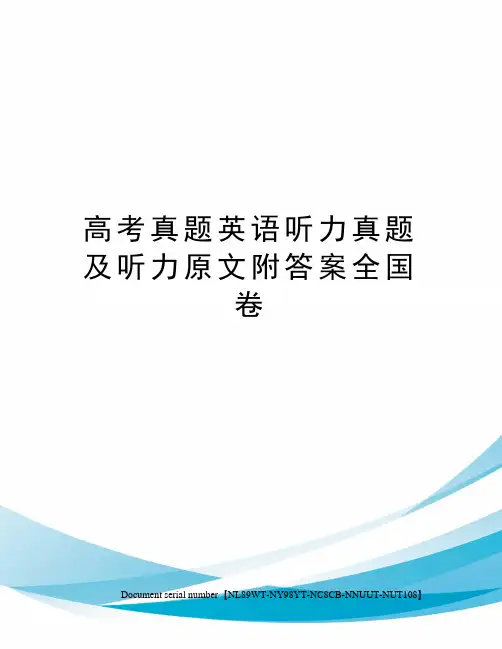
高考真题英语听力真题及听力原文附答案全国卷Document serial number【NL89WT-NY98YT-NC8CB-NNUUT-NUT108】2015年高考真题英语听力试题、原文及答案(全国卷)第一节听下面5段对话。
每段对话后有一个小题,从题中所给的A、B、C三个选项中选出最佳选项,并标在试卷的相应位置。
听完每段对话后,你都有10秒钟的时间来回答有关小题和阅读下一小题。
每段对话仅读一遍。
1. What time is it nowA. 9:10.B. 9:50.C. 10:00.2. What does the woman think of the weatherA. It’s nice.B. It’s warm.C. It’s cold.3. What will the man doA. Attend a meeting.B. Give a lecture.C. Leave his office.4. What is the woman’s opinion about the courseA. Too hard.B. Worth taking.C. Very easy.5. What does the woman want the man to doA. Speak louder.B. Apologize to her.C. Turn off the radio.第二节听下面5段对话或独白。
每段对话或独白后有几个小题,从题中所给的A、B、C三个选项中选出最佳选项,并标在试卷的相应位置。
听每段对话或独白前,你将有时间阅读各个小题,每小题5秒钟;听完后,各小题将给出5秒钟的作答时间。
每段对话或独白读两遍。
听第6段材料,回答第6、7题。
6. How long did Michael stay in ChinaA. Five days.B. One week.C. Two weeks.7. Where did Michael go last yearA. Russia.B. Norway.C. India.听第7段材料,回答第8、9题。
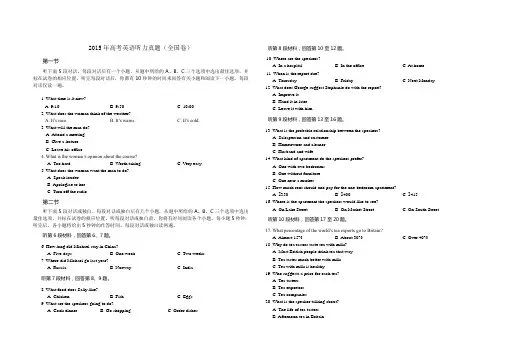
2015年高考英语听力真题(全国卷)第一节听下面5段对话。
每段对话后有一个小题,从题中所给的A、B、C三个选项中选出最佳选项,并标在试卷的相应位置。
听完每段对话后,你都有10秒钟的时间来回答有关小题和阅读下一小题。
每段对话仅读一遍。
1. What time is it now?A. 9:10.B. 9:50.C. 10:00.2. What does the woman think of the weather?A. It’s nice.B. It’s warm.C. It’s cold.3. What will the man do?A. Attend a meeting.B. Give a lecture.C. Leave his office.4. What is the woman’s opinion about the course?A. Too hard.B. Worth taking.C. Very easy.5. What does the woman want the man to do?A. Speak louder.B. Apologize to her.C. Turn off the radio.第二节听下面5段对话或独白。
每段对话或独白后有几个小题,从题中所给的A、B、C三个选项中选出最佳选项,并标在试卷的相应位置。
听每段对话或独白前,你将有时间阅读各个小题,每小题5秒钟;听完后,各小题将给出5秒钟的作答时间。
每段对话或独白读两遍。
听第6段材料,回答第6、7题。
6. How long did Michael stay in China?A. Five days.B. One week.C. Two weeks.7. Where did Michael go last year?A. Russia.B. Norway.C. India.听第7段材料,回答第8、9题。
8. What food does Sally like?A. Chicken.B. Fish.C. Eggs.9. What are the speakers going to do?A. Cook dinner.B. Go shopping.C. Order dishes.听第8段材料,回答第10至12题。
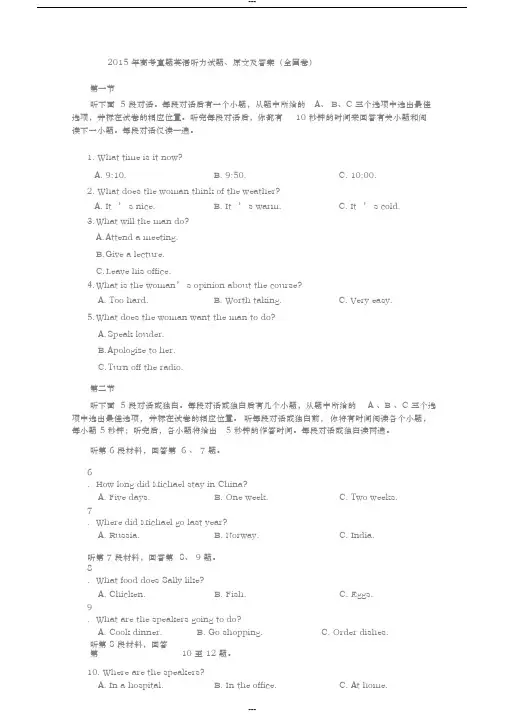
2015 年高考真题英语听力试题、原文及答案(全国卷)第一节听下面 5 段对话。
每段对话后有一个小题,从题中所给的A、 B、C 三个选项中选出最佳选项,并标在试卷的相应位置。
听完每段对话后,你都有10 秒钟的时间来回答有关小题和阅读下一小题。
每段对话仅读一遍。
1. What time is it now?A. 9:10.B. 9:50.C. 10:00.2. What does the woman think of the weather?A. It ’ s nice.B. It ’ s warm.C. It ’ s cold.3.What will the man do?A.Attend a meeting.B.G ive a lecture.C.Leave his office.4.What is the woman’ s opinion about the course?A. Too hard.B. Worth taking.C. Very easy.5.What does the woman want the man to do?A.Speak louder.B.A pologize to her.C.Turn off the radio.第二节听下面 5 段对话或独白。
每段对话或独白后有几个小题,从题中所给的 A 、B 、C 三个选项中选出最佳选项,并标在试卷的相应位置。
听每段对话或独白前,你将有时间阅读各个小题,每小题 5 秒钟;听完后,各小题将给出 5 秒钟的作答时间。
每段对话或独白读两遍。
听第 6 段材料,回答第6 、 7 题。
6. How long did Michael stay in China?A. Five days.B. One week.C. Two weeks.7. Where did Michael go last year?A. Russia.B. Norway.C. India.听第 7 段材料,回答第8、 9 题。
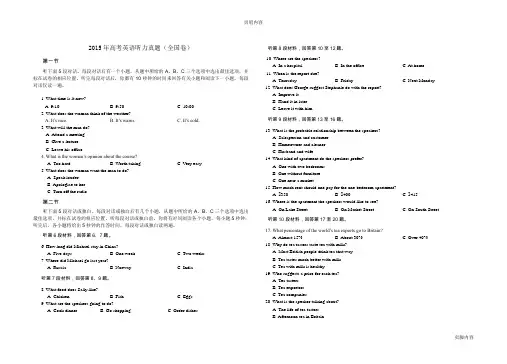
页眉内容2015年高考英语听力真题(全国卷)第一节听下面5段对话。
每段对话后有一个小题,从题中所给的A、B、C三个选项中选出最佳选项,并标在试卷的相应位置。
听完每段对话后,你都有10秒钟的时间来回答有关小题和阅读下一小题。
每段对话仅读一遍。
1. What time is it now?A. 9:10.B. 9:50.C. 10:00.2. What does the woman think of the weather?A. It’s nice.B. It’s warm.C. It’s cold.3. What will the man do?A. Attend a meeting.B. Give a lecture.C. Leave his office.4. What is the woman’s opinion about the course?A. Too hard.B. Worth taking.C. Very easy.5. What does the woman want the man to do?A. Speak louder.B. Apologize to her.C. Turn off the radio.第二节听下面5段对话或独白。
每段对话或独白后有几个小题,从题中所给的A、B、C三个选项中选出最佳选项,并标在试卷的相应位置。
听每段对话或独白前,你将有时间阅读各个小题,每小题5秒钟;听完后,各小题将给出5秒钟的作答时间。
每段对话或独白读两遍。
听第6段材料,回答第6、7题。
6. How long did Michael stay in China?A. Five days.B. One week.C. Two weeks.7. Where did Michael go last year?A. Russia.B. Norway.C. India.听第7段材料,回答第8、9题。
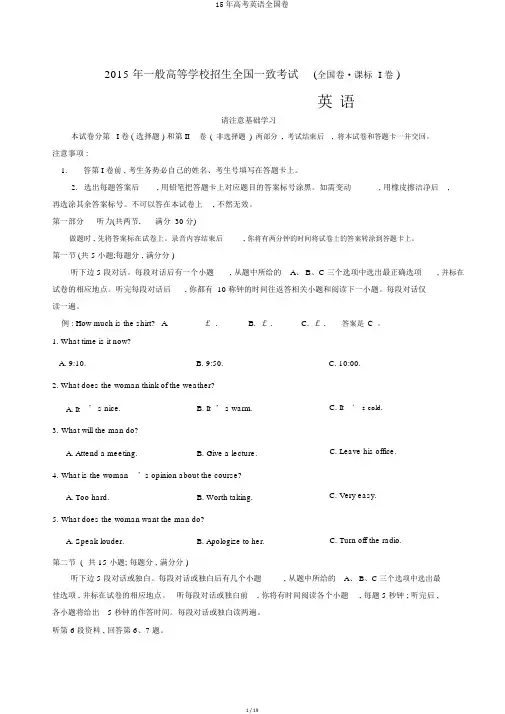
2015 年一般高等学校招生全国一致考试(全国卷·课标I卷 )英语请注意基础学习本试卷分第I 卷 ( 选择题 ) 和第 II卷(非选择题)两部分,考试结束后,将本试卷和答题卡一并交回。
注意事项 :1.答第 I 卷前 , 考生务势必自己的姓名、考生号填写在答题卡上。
2.选出每题答案后, 用铅笔把答题卡上对应题目的答案标号涂黑。
如需变动, 用橡皮擦洁净后,再选涂其余答案标号。
不可以答在本试卷上, 不然无效。
第一部分听力(共两节,满分30分)做题时 , 先将答案标在试卷上。
录音内容结束后, 你将有两分钟的时间将试卷上的答案转涂到答题卡上。
第一节 (共 5 小题;每题分 , 满分分 )听下边 5 段对话。
每段对话后有一个小题, 从题中所给的A、 B、C 三个选项中选出最正确选项, 并标在试卷的相应地点。
听完每段对话后, 你都有 10 称钟的时间往返答相关小题和阅读下一小题。
每段对话仅读一遍。
例 : How much is the shirt? A.£. B. £ . C. £ .答案是C。
1. What time is it now?A. 9:10.B. 9:50.C. 10:00.2. What does the woman think of the weather?A. It ’ s nice.B. It ’ s warm.3. What will the man do?A. Attend a meeting.B. Give a lecture.4. What is the woman ’s opinion about the course?A. Too hard.B. Worth taking.5. What does the woman want the man do?A. Speak louder.B. Apologize to her. 第二节 ( 共 15 小题; 每题分 , 满分分 )C. It’ s cold.C. Leave his office.C. Very easy.C. Turn off the radio.听下边 5 段对话或独白。
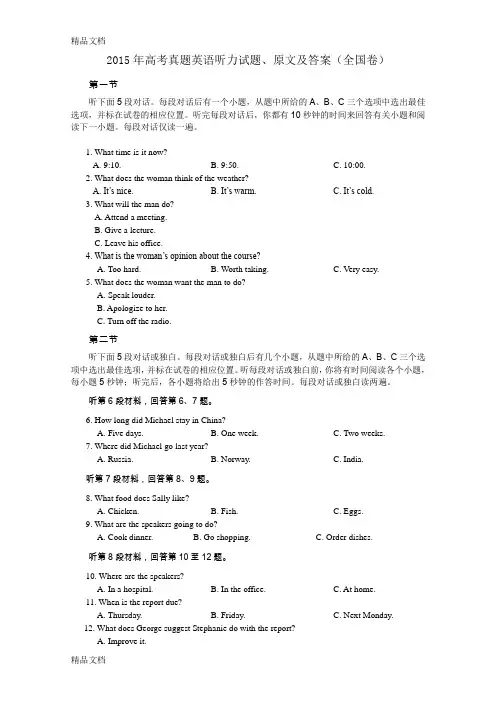
2015年高考真题英语听力试题、原文及答案(全国卷)第一节听下面5段对话。
每段对话后有一个小题,从题中所给的A、B、C三个选项中选出最佳选项,并标在试卷的相应位置。
听完每段对话后,你都有10秒钟的时间来回答有关小题和阅读下一小题。
每段对话仅读一遍。
1. What time is it now?A. 9:10.B. 9:50.C. 10:00.2. What does the woman think of the weather?A. It’s nice.B. It’s warm.C. It’s cold.3. What will the man do?A. Attend a meeting.B. Give a lecture.C. Leave his office.4. What is the woman’s opinion about the course?A. Too hard.B. Worth taking.C. Very easy.5. What does the woman want the man to do?A. Speak louder.B. Apologize to her.C. Turn off the radio.第二节听下面5段对话或独白。
每段对话或独白后有几个小题,从题中所给的A、B、C三个选项中选出最佳选项,并标在试卷的相应位置。
听每段对话或独白前,你将有时间阅读各个小题,每小题5秒钟;听完后,各小题将给出5秒钟的作答时间。
每段对话或独白读两遍。
听第6段材料,回答第6、7题。
6. How long did Michael stay in China?A. Five days.B. One week.C. Two weeks.7. Where did Michael go last year?A. Russia.B. Norway.C. India.听第7段材料,回答第8、9题。
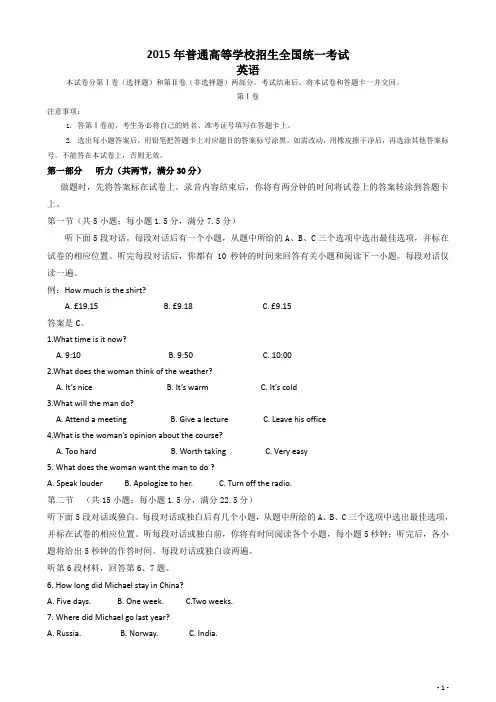
2015年普通高等学校招生全国统一考试英语本试卷分第Ⅰ卷(选择题)和第Ⅱ卷(非选择题)两部分。
考试结束后,将本试卷和答题卡一并交回。
第Ⅰ卷注意事项:1. 答第Ⅰ卷前,考生务必将自己的姓名、准考证号填写在答题卡上。
2. 选出每小题答案后,用铅笔把答题卡上对应题目的答案标号涂黑。
如需改动,用橡皮擦干净后,再选涂其他答案标号。
不能答在本试卷上,否则无效。
第一部分听力(共两节,满分30分)做题时,先将答案标在试卷上。
录音内容结束后,你将有两分钟的时间将试卷上的答案转涂到答题卡上。
第一节(共5小题;每小题1.5分,满分7.5分)听下面5段对话。
每段对话后有一个小题,从题中所给的A、B、C三个选项中选出最佳选项,并标在试卷的相应位置。
听完每段对话后,你都有10秒钟的时间来回答有关小题和阅读下一小题。
每段对话仅读一遍。
例:How much is the shirt?A. £19.15B. £9.18C. £9.15答案是C。
1.What time is it now?A. 9:10B. 9:50C. 10:002.What does the woman think of the weather?A. It’s niceB. It’s warmC. It’s cold3.What will the man do?A. Attend a meetingB. Give a lectureC. Leave his office4.What is the woman’s opinion about the course?A. Too hardB. Worth takingC. Very easy5. What does the woman want the man to do ?A. Speak louderB. Apologize to her.C. Turn off the radio.第二节(共15小题;每小题1.5分,满分22.5分)听下面5段对话或独白。
2015年高考真题英语听力试题、原文及答案(全国卷)第一节听下面5段对话。
每段对话后有一个小题,从题中所给的A、B、C三个选项中选出最佳选项,并标在试卷的相应位置。
听完每段对话后,你都有10秒钟的时间来回答有关小题和阅读下一小题。
每段对话仅读一遍.1。
What time is it now?A. 9:10.B. 9:50。
C。
10:00.2. What does the woman think of the weather?A. It’s nice. B。
It’s warm。
C. It’s cold.3。
What will the man do?A。
Attend a meeting。
B。
Give a lecture。
C。
Leave his office。
4。
What is the woman’s opinion about the course?A. Too hard。
B. Worth taking. C。
Very easy.5。
What does the woman want the man to do?A。
Speak louder.B。
Apologize to her.C. Turn off the radio.第二节听下面5段对话或独白。
每段对话或独白后有几个小题,从题中所给的A、B、C三个选项中选出最佳选项,并标在试卷的相应位置。
听每段对话或独白前,你将有时间阅读各个小题,每小题5秒钟;听完后,各小题将给出5秒钟的作答时间。
每段对话或独白读两遍。
听第6段材料,回答第6、7题。
6. How long did Michael stay in China?A. Five days。
B。
One week. C。
Two weeks。
7。
Where did Michael go last year?A。
Russia。
B. Norway。
C. India。
听第7段材料,回答第8、9题.8. What food does Sally like?A. Chicken. B。
试题类型:A 2015年普通高等学校招生全国统一考试(新课标I)英语注意事项:1. 本试卷分第Ⅰ卷(选择题)和第Ⅱ卷(非选择题)两部分。
2. 答题前,考生务必将自己的姓名、准考证号填写在本试卷相应的位置。
3. 全部答案在答题卡上完成,答在本试卷上无效。
4. 第Ⅰ卷听力部分满分30分,不计入总分,考试成绩录取时提供给高校作参考。
5. 考试结束后,将本试卷和答题卡一并交回。
第Ⅰ卷第一部分听力(共两节,满分30分)做题时,先将答案标在试卷上,录音内容结束后,你将有两分钟的时间将试卷上的答案转涂到答题卡上。
第一节(共5小题;每小题1.5分,满分7.5分)听下面5段对话,每段对话后有一个小题。
从题中所给的A、B、C三个选项中选出最佳选项,并标在试卷的相应位置。
听完每段对话后,你都有10秒钟的时间来回答有关小题和阅读下一小题。
每段对话仅读一遍。
例:How much is the shirt?A.£ 19.15B.£ 9.18C.£ 9.15答案是C。
1. What time is it now?A.9:10B.9:50C.10:002. What does the woman think of the weather?A. It’s nice.B. It’s warmC. It’s cold3. What will the man do?A. Attend a meeting.B. Give a lectureC. Leave his office.4. What is the woman’s opinion about the course?A. Too hard.B. Worth taking.C. Very easy.5. What does the woman want the man to do?A. Speak louder.B. Apologize to her.C. Turn off the radio.第二节(共15小题;每小题1.5分,满分22.5分)听下面5段对话或独白。
2015年高考全国卷2英语试题及答案第Ⅰ卷第一部分听力(共两节,满分30分)略第二部分阅读理解(共两节,满分40分)AMy color television has given me nothing but a headache. I was able to buy it a little over a y ear ago because I had my relatives give me money for my birthday instead of clothes th at wo uldn’t fit. I let a salesclerk fool me into buying a discontinued model. I realized this a day later, wh en I saw newspaper advertisements for the set at seventy-five dollars less than I had paid. Th e set worked so beautiful when I first got it home that I would keep it on until stations signed off for the 、night. Fortunately, I didn’tget any channels showing all-night movies or I would never have gotten to bed.Then I started developing a problem with the set that involved static(静电) noise. For some reason, when certain shows switched into a commercial, a loud noise wo uld sound for a few seconds. Gradually, this noise began to appear during a show, and to get rid of it, I had to change to another channel and then change it back. Sometimes this techniq ue would not work, and I had to pick up the set and shake it to remove the sound. I actually began to build up my arm muscles(肌肉) shaking my set.When neither of these methods removed the static noise, I would sit helplessly and wait for t he noise to go away. At last I ended uphitting the set with my first, and it stopped working al together. My trip to the repair shop cost me $62, and the sit is working well now, but I keep e xpecting more trouble.21. Why did the author say he was fooled into buying the TV set?A. He got an older model than he had expected.B. He couldn’t return it when it was broken.C. He could have bought it at a lower price.D. He failed to find any movie shows on it.22. Which of the following an best replace the phrase “signedoff” in paragraph 1?A. ended all their programsB. provided fewer channelsC. changed to commercialsD. showed all-night movies23. How did the author finally get this TV set working again?A. By shaking and hitting itB. By turning it on and offC. By switching channelsD. By having it repaired24. How does the author sound when telling the story?A. CuriousB. AnxiousC. CautiousD. HumorousBYour house may have an effect on your figure. experts say the way you design your home cou ld play a role in whether you pack on the pounds or keep them off. you can make yourenviro nment work for you instead of against you. Here are some ways to turn your home into part of your diet plan. Open the curtains and turn up the lights. dark environments are more likely to encourage overeating, for people are often less self-conscious(难为情) when they’re in poorly lit places –and so more likely to eat lots of food. If your home doesn’t have enough window light, get more lamps and flood the place with brightness. Mind the colors. Research suggests warm colors fuel our appetites. In one study, people who ate meals in a blue room consumed 33 percent less than those in a yellow or red room. Warm colors like yellow make food appear more appetizing, while cold colors make us less hungry. So when it’s time to repaint, go blue. Don’t forget the clock –or the radio. People who eat slowly tend to consume about 70 fewer calories(卡路里)per meal than those who rush through their meals. Begin keeping track of the time, and try to make dinner last at 30 minutes. And while you’re at it, actually sit down to eat. If you need some help slowing down, turning on relaxing music. It makes you less likely to rush through a meal. Downsize the dishes. Big serving bowls and plants can easily makes us fat. We eat about 22 percent more when using a 12-inch plate instead of a 10-inch plate. When we choose a large spoon over a smaller one, total intake(摄入) jumps by 14 percent. And we’ll pour about 30 percent more liquid into a short, wide glass than a tall, skinny glass.25. The text is especially helpful for those who care about ____.A. their home comfortsB. their body shapeC. house buyingD. healthy diets26. A home environment in blue can help people ____.A. digest food betterB. reduce food intakeC. burn more caloriesD. regain their appetites27. What are people advised to do at mealtimes?A. Eat quickly.B. Play fast music.e smaller spoonsD. Turn down the lights28.What can be a suitable title for the text?A. Is Your House Making You Fat?B. Ways of Serving DinnerC. Effects of Self-ConsciousnessD. Is Your Home Environment Relaxing?CMore students than ever before are taking a gap year(间隔年) before going to university. It used to be the “year off” between school and university. The gap-year phenomenon originated(起源) with the monthsleft over to Oxbridge applicants between entrance exams in November and the start of the next academic year.This year, 25,310 students who have accepted places in higher education institutions have pu t off their entry until next year, according to statistics on university entrance provided by theUniversity and College Admissions Service (UCAS). That is a record 14.7% increase in the number of students taking a gap year. Tony Higgins from UCAS said that the statistics are good news for everyone in highereducation. “Students who take a well-planned year out are more likely to be satisfied with, and complete, their chosen course. Students who take a gap year are often more mature and responsible,”he said. But not everyone is happy. Owain James, the president of the National Union of Students (NUS), argued that the increase is evidence of studenthardship –young people are being forced into earning money before finishing their education. “New students are now aware that they are likely to leave university up to£15,000 in debt. It is not surprising that more and more students are taking a gap year to earn money to support their study for the degree. NUS statistics show that over 40% of students are forced to work during term time and the figure increases to 90% during vacating periods,”he said.29.What do we learn about the gap year from the text?A.It is flexible in length.B. It is a time for relaxationC. It is increasingly popularD. It is required by universities30.According to Tony Higgins. students taking a gap year ____.A.are better prepared for college studiesB. know a lot more about their future jobC. are more likely to leave university in debtD. have a better chance to enter top universities31.How does Owain James feel about the gap-year phenomenon?A.He’s puzzledB. He’s worriedC. He’s surprisedD. He’s annoyed32.What would most students do on their vacation according to NUS statistics?A.Attend additional courses.B. Make plans for the new termC. Earn money for their educationD. Prepare for their graduate studiesDChoose Your One-Day-Tours!Tour A - Bath &Stonehenge: including entrance fees to the ancient Roman bathrooms and St onehenge -£37 until 26 March and £39 thereafter.Visit the city with over 2,000 years of history and Bath Abbey, the Royal Crescent and the Cos tume Museum, Stonehenge is one of the world's most famous prehistoric monuments dating back over 5,000 years.Tour B - Oxford & Startford including entrance fees to the University St Mary's Church Tower and Anne Hathaway's -£32 until 12 March and £36 thereafterOxford: Includes a guided tour of England's oldest university city and colleges. Look over the "city of dreaming spires(尖顶)"from St Mary’s Church Tower. Stratford: Includes a guided tour exploring much of the Shakespeare wonder.Tour C - Windsor Castle &Hampton Court including entrance fees to Hampton Court Palace -£34 until 11 March and £37 thereafter.Includes a guided tour of Windsor and Hampton Court, Henry VILL's favorite palace. Free tim e to visit Windsor Castle(entrance fees not included).With 500 years of history, Hampton Cou rt was once the home of four Kings and one Queen. Now this former royal palace is open to t he public asa major tourist attraction. Visit the palace and its various historic gardens, which include the famous maze(迷宫)where it is easy to get lost!Tour D -Cambridge including entrance fees to the Tower of Saint Mary the Great -£33 until 18 March and £37 thereafter.Includes a guided tour of Cambridge, the famous university town, and the gardens of the 18th century.33. Which tour will you choose if yo u want to see England’s oldest university city?A. Tour AB. Tour BC. Tour CD. Tour D34. Which of the following tours charges the lowest fee on 17 March?A. Windsor Castle & Hampton CourtB. Oxford & StratfordC. Bath & StonehengeD. Cambridge35. Why is Hampton Court a major tourist attraction?A. It used to be the home of royal familiesB. It used to be a well-known mazeC. It is the oldest palace in BritainD. It is a world-famous castle第二节((共5小题;每小题2分,满分10分)根据短文内容,从短文后的选项中选出能填入空白处的最佳选项。
2015年高考全国卷2英语试题第Ⅰ卷第一部分 听力(共两节,满分30分)略第二部分 阅读理解(共两节,满分40分)AMy color television has given me nothing but a headache. I was able to buy it a little over a year ago because I had my relatives give me money for my birthday instead of clothes that wouldn’t fit. I let a salesclerk fool me into buying a discontinued model. I realized this a day later, when I saw newspaper advertisements for the set at seventy-five dollars less than I had paid. The set worked so beautiful when I first got it home that I would keep it on until stations signed off for the night. Fortunately, I didn’t get any channels showing all-night movies or I would never have gotten to bed.Then I started developing a problem with the set that involved static(静电) noise. For some reason, when certain shows switched into a commercial, a loud noise would sound for a few seconds. Gradually, this noise began to appear during a show, and to get rid of it, I had to change to another channel and then change it back. Sometimes this technique would not work, and I had to pick up the set and shake it to remove the sound. I actually began to build up my arm muscles(肌肉) shaking my set.When neither of these methods removed the static noise, I would sit helplessly and wait for the noise to go away. At last I ended up hitting the set with my first, and it stopped working altogether. My trip to the repair shop cost me $62, and the sit is working well now, but I keep expecting more trouble.21. Why did the author say he was fooled into buying the TV set?A.He got an older model than he had expected.B.He couldn’t return it when it was broken.C.He could have bought it at a lower price.D.He failed to find any movie shows on it.【参考答案】C【考查内容】细节理解题【解析思路】根据第一段第四行“when I saw newspaper advertisements for the set at seventy-five dollars less than I had paid.”当我看到报纸上75美元比我买的价格低的时候,我感觉我上当了。
试题类型:A 2015年普通高等学校招生全国统一考试(新课标I)英语第Ⅰ卷第一部分听力(共两节,满分30分)做题时,先将答案标在试卷上,录音内容结束后,你将有两分钟的时间将试卷上的答案转涂到答题卡上。
第一节(共5小题;每小题1.5分,满分7.5分)听下面5段对话,每段对话后有一个小题。
从题中所给的A、B、C三个选项中选出最佳选项,并标在试卷的相应位置。
听完每段对话后,你都有10秒钟的时间来回答有关小题和阅读下一小题。
每段对话仅读一遍。
例:How much is the shirt?£ 19.15 B.£ 9.18 C.£ 9.15答案是C。
1. What time is it now?A.9:10B.9:50C.10:002. What does the woman think of the weather?A. It’s nice.B. It’s warmC. It’s cold3. What will the man do?A. Attend a meeting.B. Give a lectureC. Leave his office.4. What is the woman’s opinion about the course?A. Too hard.B. Worth taking.C. Very easy.5. What does the woman want the man to do?A. Speak louder.B. Apologize to her.C. Turn off the radio.第二节(共15小题;每小题1.5分,满分22.5分)听下面5段对话或独白。
每段对话或独白后有几个小题,从题中所给的A、B、C三个选项中选出最佳选项,并标在试卷的相应位置。
听每段对话或独白前,你将有时间阅读各个小题,每小题5秒钟;听完后,各小题将给出5秒钟的作答时间。
听力录音材料听力录音材料 Text 1W: What time is your train leaving?M: It leaves at ten. I’ve got fifty minutes left.W: You’d better hurry, or you won’t be able to catch it.Text 2M: Nice weather we’re having, don’t you think?W: No. It is too cold.M: I think it is just right.W: I’d prefer it a few degrees warmer.Text 3M: Now, let’s stop talking and get going. I need to be in my office in fifteen minutes, or I’ll be late for a meeting.W: Okay, bye.Text 4M: This course is really difficult.W: I don’t think it’s all that bad. And we’ll benefit a lot from it.M: So, you’re taking it too?W: That’s true.Text 5W: Could you turn that off? I can’t hear myself think.M: What?W: The radio.M: Oh! Sorry.Text 6W: Hi Michael! I heard you just came back from a holiday.M: Yes. I stayed for a week in China, and five days in India.W: You do travel a lot, don’t you? Last year, you went to Norway, right?M: Well, I’ve been to quite some countries, but not yet to Norway. Last summer, I toured Russia for two weeks.Text 7M: Sally, do you like seafood?W: Yes, of course. M: Is there anything you especially like?W: Well, I really don’t know. I can never remember the names.M: Okay. Is there any food you don’t eat?W: Well, I don’t eat chicken. And I don’t like eggs, either. B ut I like all kinds of fish and vegetables.M: Then let’s look at the menu and see what they’ve got for us.Text 8M: You look pale, Stephanie. What’s wrong?W: I don’t feel good. I have a bad headache. In fact, I haven’t got much sleep this past week, an d I feel really tired.M: Why don’t you go to see a doctor?W: Yeah, I think I should. But I have a report due tomorrow. Ms. Jenkins needs it for the board meeting next Monday.M: Well, it’s Wednesday today. Why don’t you talk to Ms. Jenkins, and ask if yo u can hand it in on Friday morning?W: Maybe I should try. I guess I just need a good sleep. Thanks, George. M: If you need any help with the report, just let me know.Text 9W: Anything interesting in the paper today, dear?M: Well, yeah. There are a few here that might interest us. Here’s one for just four hundred dollars. It only has one bedroom, but it sounds nice, near Lake Street.W: Y eah. Let me see what the cheapest two-two-bedroom bedroom apartment is. Oh, here’s one on Market Street. It’s a real bargain. Only three hundred and fifty dollars. But it doesn’t have any furniture. M: Well, it costs a lot to buy all the furniture.W: Oh, here’s another one for just over four hundred dollars. This sounds very interesting! It’s on South Street. That’s a nice area.M: M: Yes, it’s quiet. Did you say two bedrooms?Yes, it’s quiet. Did you say two bedrooms?W: Yes, at four hundred and fifteen dollars.M: Why don’t we go and have a look?W: Okay, I’ll give them a call.Text 10Look at this picture. It’s the London Tea Trade Centre. As you can see, it is on the north bank of the river Thames. It is the center of an important industry in the everyday lives of the British people. Tea is the British national drink. Every man, woman, and child over ten years of age has on average over four cups a day. Or some one thousand, five hundred cups annually. About thirty percent of the world’s exports of tea makes its way to London. And Britain is by far the largest importer of tea in the world. Now, in the second picture, you can see how tea is tasted in the Tea Trade Centre before it is sold. Here, different types of tea are tasted by skilled tea tasters, before they’re sold at each week’s tea sale. It’s amazing to see them at work. Over a hundred kinds of tea are laid out in a line on long tables. The tasters generally taste teas with milk, since that is how the majority of British people drink their tea. The tasters move down the line with surprising speed, tasting from a spoon and deciding what is a fair price for each tea. After that, they…听力答案:1-5 ACABC 6-10 BABCB 11-15 ABCAB 16-20 CBAAC。
2015年高考真题英语听力试题、原文及答案(全国卷)第一节听下面5段对话。
每段对话后有一个小题,从题中所给的A、B、C三个选项中选出最佳选项,并标在试卷的相应位置。
听完每段对话后,你都有10秒钟的时间来回答有关小题和阅读下一小题。
每段对话仅读一遍。
1. What time is it now?A. 9:10.B. 9:50.C. 10:00.2. What does the woman think of the weather?A. It’s nice.B. It’s warm.C. It’s cold.3. What will the man do?A. Attend a meeting.B. Give a lecture.C. Leave his office.4. What is the woman’s opinion about the course?A. Too hard.B. Worth taking.C. Very easy.5. What does the woman want the man to do?A. Speak louder.B. Apologize to her.C. Turn off the radio.第二节听下面5段对话或独白。
每段对话或独白后有几个小题,从题中所给的A、B、C三个选项中选出最佳选项,并标在试卷的相应位置。
听每段对话或独白前,你将有时间阅读各个小题,每小题5秒钟;听完后,各小题将给出5秒钟的作答时间。
每段对话或独白读两遍。
听第6段材料,回答第6、7题。
6. How long did Michael stay in China?A. Five days.B. One week.C. Two weeks.7. Where did Michael go last year?A. Russia.B. Norway.C. India.听第7段材料,回答第8、9题。
8. What food does Sally like?A. Chicken.B. Fish.C. Eggs.9. What are the speakers going to do?A. Cook dinner.B. Go shopping.C. Order dishes.听第8段材料,回答第10至12题。
10. Where are the speakers?A. In a hospital.B. In the office.C. At home.11. When is the report due?A. Thursday.B. Friday.C. Next Monday.12. What does George suggest Stephanie do with the report?A. Improve it.B. Hand it in later.C. Leave it with him.听第9段材料,回答第13至16题。
13. What is the probable relationship between the speakers?A. Salesperson and customer.B. Homeowner and cleaner.C. Husband and wife.14. What kind of apartment do the speakers prefer?A. One with two bedrooms.B. One without furniture.C. One near a market.15. How much rent should one pay for the one-bedroom apartment?A. $350.B. $400.C. $415.16. Where is the apartment the speakers would like to see?A. On Lake Street.B. On Market Street.C. On South Street.听第10段材料,回答第17至20题。
17. What percentage of the world’s tea exports go to Britain?A. Almost 15%.B. About 30%.C. Over 40%.18. Why do tea tasters taste tea with milk?A. Most British people drink tea that way.B. Tea tastes much better with milk.C. Tea with milk is healthy.19. Who suggests a price for each tea?A. Tea tasters.B. Tea exporters.C. Tea companies.20. What is the speaker talking about?A. The life of tea tasters.B. Afternoon tea in Britain.C. The London Tea Trade Centre.录音原文Example:M: Excuse me, can you tell me how much the shirt is?W: Yes, it’s nine-fifteen.Text 1W: What time is your train leaving?M: It leaves at ten. I’ve got f ifty minutes left.W: You’d better hurry, or you won’t be able to catch it.Text 2M: Nice weather we’re having, don’t you think?W: No. It is too cold.M: I think it is just right.W: I’d prefer it a few degrees warmer.Text 3M: Now, let’s stop talking and get going. I need to be in my office in fifteen minutes, or I’ll be late for a meeting.W: Okay, bye.Text 4M: This course is really difficult.W: I don’t think it’s all that bad. And we’ll benefit a lot from it.M: So, you’re taking it too?W: T hat’s true.Text 5W: Could you turn that off? I can’t hear myself think.M: What?W: The radio.M: Oh! Sorry.Text 6W: Hi Michael! I heard you just came back from a holiday.M: Yes. I stayed for a week in China, and five days in India.W: You do trav el a lot, don’t you? Last year, you went to Norway, right?M: Well, I’ve been to quite some countries, but not yet to Norway. Last summer, I toured Russia for two weeks.Text 7M: Sally, do you like seafood?W: Yes, of course.M: Is there anything you especially like?W: Well, I really don’t know. I can never remember the names.M: Okay. Is there any food you don’t eat?W: Well, I don’t eat chicken. And I don’t like eggs, either. But I like all kinds of fish and vegetables.M: Then let’s look at the menu and see what they’ve got for us.Text 8M: You look pale, Stephanie. What’s wrong?W: I don’t feel good. I have a bad headache. In fact, I haven’t got much sleep this past week, and I feel really tired.M: Why don’t you go to see a doctor?W: Yeah, I think I should. But I have a report due tomorrow. Ms. Jenkins needs it for the board meeting next Monday.M: Well, it’s Wednesday today. Why don’t you talk to Ms. Jenkins, and ask if you can hand it in on Friday morning?W: Maybe I should try. I guess I just need a good sleep. Thanks, George.M: If you need any help with the report, just let me know.Text 9W: Anything interesting in the paper today, dear?M: Well, yeah. There are a few here that might interest us. Here’s one for just four hundred dollars. It only has one bedroom, but it sounds nice, near Lake Street.W: Yeah. Let me see what the cheapest two-bedroom apartment is. Oh, here’s one on Market Street. It’s a real bargain. Only three hundred and fifty dollars. But it doesn’t have any furniture.M: Well, it costs a lot to buy all the furniture.W: Oh, here’s another one for just over four hundred dollars. This sounds very interesting! It’s on South Street. That’s a ni ce area.M: Yes, it’s quiet. Did you say two bedrooms?W: Yes, at four hundred and fifteen dollars.M: Why don’t we go and have a look?W: Okay, I’ll give them a call.Text 10Look at this picture. It’s the London Tea Trade Centre. As you can see, it is on the north bank of the river Thames. It is th e center of an important industry in the everyday lives of the British people. Tea is the British national drink. Every man, woman, and child over ten years of age has on average over four cups a day. Or some one thousand five hundred cups annually. About thirty percent of the world’s e xports of tea makes its way to London. And Britain is by far the largest importer of tea in the world.Now, in the second picture, you can see how tea is tasted in the Tea Trade Center before it is sold. Here, different types of tea are tasted by skilled tea tasters, before they’re sold at each week’s tea sale. It’s amazing to see them at work. Over a hundred kinds of tea are laid out in a line on long tables. Th e tasters generally taste teas with milk, since that is how the majority of British people drink their tea. The tasters move down the line with surprising speed, tasting from a spoon and deciding what is a fair price for each tea. After that, they…参考答案1-5: ACABC 6-10: BABCB 11-15: ABCAB 16-20: CBAAC科教兴国。